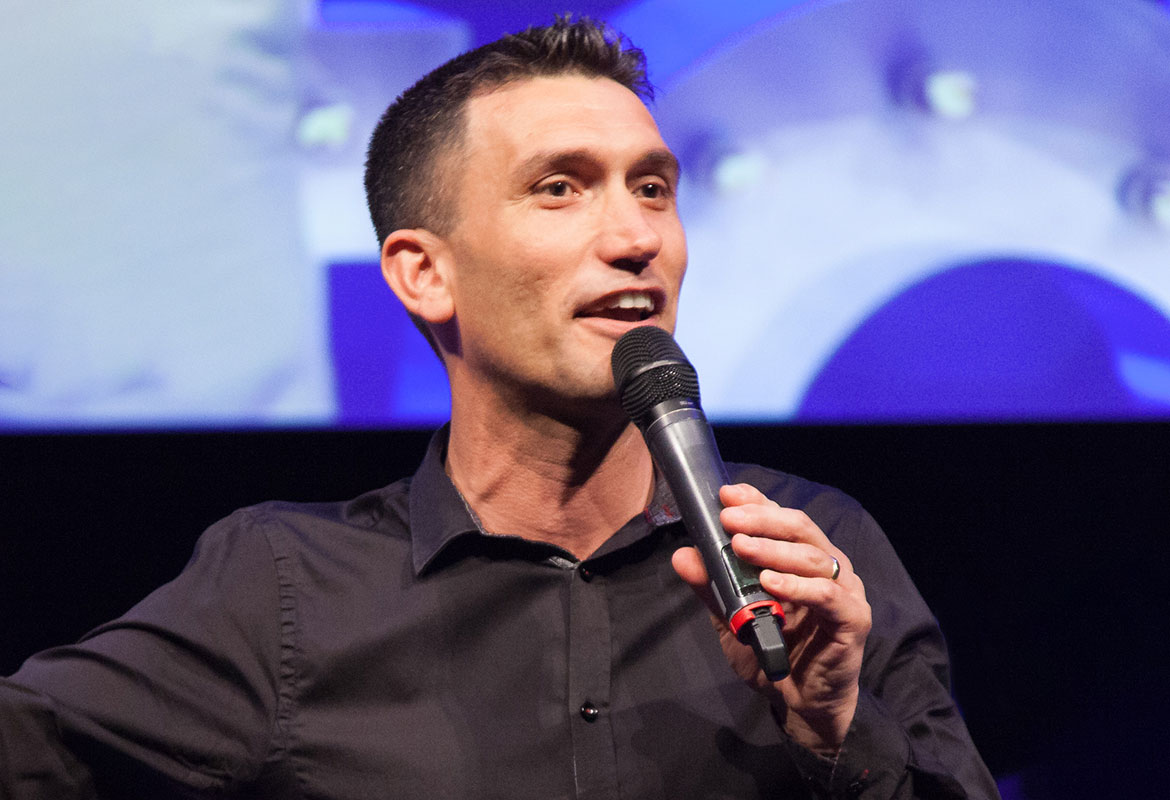
November 2019
Understanding what servant leadership looks like
Stuart Blount and Dave Newton reflect on the Elim Leaders Summit 2019 and the implications of the message that Dan Lian shared about leadership: Spirt-led. Servant-minded. Shepherd-hearted.
DAVE: It's my pleasure today to introduce our special guest Stuart Blount, Director of Ministry for Elim and we're going to be reflecting on one of Dan Lian's talks that he did at the Leadership Summit in 2019.
If you want to listen to the talk in full you can go to elim.org.uk/podcasts and download the talk there and it's particularly the one on Thursday morning where Dan was talking about leadership.
But before we get there, Stuart what were your reflections on ELS? How did you enjoy things?
STUART: Well I mean I always look forward to ELS. Like many of our the guys and girls out there, it's about often meeting with friends old and new and colleagues.
But I think that the two sessions that probably stood out to me the most were the one we're going to talk about: Dan Lian's session on Thursday morning which we'll unpack a little bit. But I think the other one was Gavin Calver's talk when he talked about pressing on.
I think I was most impacted as Gavin talked about the church finding fresh confidence, culturally, in society. And we're not always gonna be understood. We've got to accept that and get on with it and I think that resonated with a lot of where I'm thinking at the moment. And I just love the way Gavin communicates anyway as well.

DAVE: It's brilliant. It was a great time and so many people gathering together in Harrogate and we're looking forward to 2020.
Dan Lian's session on Thursday morning was kind of slightly more understated if we could say that, than Dan's kind of Wednesday night session, the give me five session. And yet very poignant in its own way where he picked up on one of our priorities in Elim which is developing leaders and started with this kind of we need to get the definition of leadership right.
Do you want to talk a little bit about why definitions matter and particularly this definition of leadership?
STUART: I thought that was brilliant. I mean obviously he was very much more as you say laid back and talked that day about how he'd waited on God that morning and felt he had something for us.
And I think this whole thing of definitions is really important. I think he talked in that session, if I remember rightly, about how leadership was developed and the term leadership only kind of really emerged mainly in the 1980s and the connection with the business world. And I can see some merit in that.
But I think it's really important we do understand what we mean by leadership and what leadership embraces in a Christian context. We can't import everything that happens in a different cultural context.
We have to shape that don't we through our Biblical mind mindset. But I think it is important for us it's every period of our development and growth to sometimes be asking that question what does leadership look like Dave? What should it look like? What does it mean for us?
So I found that helpful and of course he was able to give a framework for that in those three points which you'll lead us to chat about. I thought was really good and resonated a lot with me so looking forward to our chat around those. But I thought the whole point about taking time to consider what do we mean by leadership was a real good starter for ten in many ways in our consideration.

DAVE: Yeah and I think vital for us as a movement when we're talking about our priorities, you know it's easy to use words like discipleship, leadership, and think we all know what we're talking about and yet we've all got slightly different definitions.
So he went on to define Christian leadership under three headings and we're just gonna take a moment to reflect on those. And the first one Stuart was was Spirit led. What is Spirit-led leadership and maybe more importantly how do we know as leaders if we are being led by the Spirit?
STUART: Yeah, important isn't it? Again it's what measurement do we put around that.
For me, I think that we need to look at what the Bible says about being Spirit-led and from my memory, the context of that kind of phrase in Galatians 5 is about fruit. Character fruits. The fruit of our hearts and our lives, not just the fruits of our ministries. I think sometimes Dave as Pentecostals we could be guilty of measuring our fruit in ministry terms.
And we've all heard it over the years about characters more important than gifting but we fall into that trap over the years of our ministry of looking at our fruitfulness in ministry in terms of the things we've achieved. But ultimately a life that's led by the Spirit flows from the foundation of a character that's being formed out of connection with Jesus, the Father, through the Spirit.
Obviously who's within us and I suppose for me truly Spirit-led believers behave differently and react differently and respond differently and think differently and ultimately lead differently. And the fountain of it all, you know you've quoted Proverbs 4:23 as I have: Guard your heart as from it flows the issues of life, is being Spirit-led. It's about our character surely and who we are and we lead from that place.
DAVE: Yeah and there was a great little moment or a phrase that, play on words really, between imitation and inspiration. And I imagine that the leader who's operating out of their own strengths and their own gifts, it's so easy to be tempted just to copy what everyone else is doing. Did you want to comment at all on that, that relationship?
STUART: Yeah when I was listening to it again in readiness for our chat today you've got me thinking about the shortcuts that sometimes people can look for in ministry. I'm not sure there are any shortcuts and maybe that's after 32, 33 years of ministry I can say that.
But for me sometimes it's the difference between cooking a meal from scratch which takes longer, in contrast, to buy in fast food, because there yes there are some shortcuts and they're so freely available today. And Dan talked about that.
Skip one line and you can pick something up but actually, a Spirit-led ministry surely frozen the life of a man or a woman who's been with God. And I know for me and my journey the most satisfying times often came out to the times I've had to work at it to connect with God to get something fresh to work from that place. And I just think we've got to be careful about looking at short-termism.
When the Spirit is working in our life he's committed to us for the duration of this life into the next. And I think that in leadership today we need to take that long-term view. I think that what I would love to see happen more and more in this context in leadership, is that we see leadership being birthed out of discipleship and again we're coming back to our four priorities which are very current for us.
But I think we need to be delivered from the challenge of comparison. I've struggled with that for periods of my ministry over many, many years. People either in our movement or much bigger personalities that we aspire to be like. In real terms, being Spirit-led is saying: Holy Spirit, can you help me be the best I can be for Jesus and his kingdom?

DAVE: Yeah I remember as a young preacher kind of modelling my own or honing my gifting. I was like a chameleon. So I hear someone preach and then that's what I'm gonna be for the next six months, then you hear someone else or you read a book and you go that way and then you swing to the other.
It's important to hear what God's saying to us as leaders. Dan then went on to say servant-hearted. I think you know in the last 10 years we've all got hold of servanthood and leadership hand in hand. But you know 15, 20 years ago that the notion of, particularly in the business world, that the servant leader being anywhere near leadership it kind of didn't make sense, it was countercultural. But Dan said that there's no other definition of leadership than servant leadership. Talk to us about that.
STUART: I absolutely agree with him because I sometimes get concerned about the cultural shift in Pentecostal charismatic churches when it comes to our view on leadership.
Sometimes too much can revolve around being seen and being heard and being noticed. Now I love what Dan said about Jesus washing his disciple's feet and it made me ask myself, what do I do in service for the teams that I lead, for people I lead around.
One Elim leader who played a key part in my life ever a lot my development used to say, we all need to do something each week that reminds us that we're servants and that we never rise above that. It got me reflecting when he talked about Jesus washing the disciple's feet in that way, how Jesus was saying that serving isn't the way to greatness, serving is greatness. And that's a paradigm shift and it's countercultural in many ways.
And I tend to think that Heaven's measurements of successful leadership are going to be a lot different than ours. One of my great heroes, you know, I've got a big poster in my office of Dr Martin Luther King Jr.
He once said that everybody can be great because anybody can serve. You don't have to have a college degree to serve. You don't have to make your subject and verb agree to serve, you only need a heart full of grace as a soul generated by love. And I think what Dan unpacked for us was at the foundation of it all is God's called us to serve him, to serve his people, to serve the world and that's the measurement of greatness.
DAVE: Whereas we've kind of switched it the other way around and we think success means people are running around serving us and that so easily creeps into Christian leadership if we're not careful.
STUART: And the longer you go and if you do see fruitfulness in your ministry, so for example, if your church influence grows or you get greater opportunities it's as sorts of people, there is a real danger in that and there is a culture out there, let's be honest, that actually promotes that and I think as a movement, when we look at leadership, when we begin to define leadership, I think would do as well to keep reminding each other that actually are acts of service, are acts of greatness, you know in as much you've done it's the least of these again to me.
DAVE: Yeah and there was a phrase Dan used that if serving is beneath you then kingdom leadership is beyond you and that was kind of really poignant. Amazing.
And I know this the third theme it's one that's very passionate to you. The whole notion of the shepherd's heart or the pastor's heart. If you have no shepherd's heart then you're no pastor or leader at all was that the phrase that that Dan used. Talk to us about the role of the shepherd or the pastor as a leader and that kind of partnership.

STUART: This is where I might run away with it, as you know I am passionate about this. It matters to me because I think it mattered to Jesus. But even when you look back into the Old Testament, God talks about his people as sheep who need shepherding, and I think too many leaders are seeing people in their churches as a means to an end and not their responsibility.
And if we pastor a church, you know, whether we like or not, every person is part of our responsibility. And to use another metaphor the Father wants us to look after his children. I've got kids, you've got kids. I've just become a grandfather so that's exciting but it made me think about who would I trust to look after my children or my granddaughter.
And there's a high level of trust. And I think that we need to remind ourselves that Jesus represented even his own life for ministry as a shepherd and the heart of people. I think that we need to come around full circle.
When I came into ministry there was a strong emphasis on pastoral work and pastoral care for people. And I think that we've grown to a place where we talk about leadership a lot, but maybe even with recent books have come out like lead like a shepherd, and people like Jack Hayford is a real key influencer in my years and his book Pastors of Promise, just to myself it is an amazing calling and privilege to shepherd God's people.
DAVE: Yeah. It's amazing. And so, how do you balance the kind of the shepherding and the caring with what is my kind of understanding that leadership will be leading people to that new space or that new horizon. How do those two kinda sit in tension together?

STUART: Well I mean, the whole essence of shepherding is leadership. You know you're leading people. I mean, you know the adage, that you know if you. The shepherd who's got no sheep following him is just going on a long walk. And the reality is that if we are.
We want vision, we want to head somewhere, but we called to take people with us.
And for them to grow on that journey and for them to develop so in that journey lambs become sheep, you know, and then the lambs that become sheep produce lambs that become sheep. And it all connects, it's joining the dots of leadership and discipleship. It all does connect in the bigger purpose. And I think that taking people on a journey is not just about we're going there, let's all go, this is the way. We've got to lead them on that, we've got to look after them, they've got to be fed on the way. Sometimes they have to be pulled back into line on the journey if you're using that metaphor.
That's all shepherding and you know a key verse that I love is in Psalm 78. How David, King David shepherded them with integrity apart and he led them, and how Asaph the psalmist talks there about David both as a leader and a shepherd. I think the two are not mutually exclusive Dave. I think they can be mutually inclusive. You can lead people and shepherd them.
DAVE: Jesus talks about the sheep knowing the Shepherd's voice and Dan kind of twisted that phrase a little bit on it on its head and said that we need to have shepherds hearts not just wear sheep's cologne.
And then how is it that people will spot that the false shepherd or the shepherd that does really have the sheep's heart?
STUART: I think it is the heart. I mean I think Jesus says in John 10, doesn't he, that the hired hand runs away when the wolf comes. So maybe one of the ways we spot a shepherd is when the sheep, the local fellowship, the congregation, is in it's difficult times where the there's not an obvious material, physical enemy, maybe we're always in the spiritual attack. But the Shepherd is concerned for the well-being of the sheep and if we have to stop our agenda for a little while to protect the sheep, to look after them.
If we have to nestle in and say we're gonna get through this dark knight and then in the morning we'll move on, you can use the analogy itself to say that Jesus says you know the hired hand doesn't want to be around when there's a problem, just wants to be around everything's glorious. And many of our guys and girls out there on the field are leading people through difficult times.
Either the congregation's struggling in some ways or individual people. I think a shepherd is seen in the challenges that are there, they're around, they're looking to help and guide people through. Lots of other ways but I think that Jesus gives us a bit of insight in John 10.

DAVE: And Stuart, in your role in Elim, you're involved in the kind of the ministry development, bringing people into ministry, deploying them into their call and it will be fair to say ministry not just in Elim but it's become much more professionalised.
So does that place a challenge on the vocation, on the calling, on the heart of the shepherd? You know, we're professional ministers but we're also called to serve.
STUART: And I believe in both. As you know, I believe we need to be equipped. I think our culture is asking more of us than sometimes the church. Whereas historically looking back, there wasn't a great expectation in my early years.
People led the churches but the eyes of culture are upon us. So yes we do have to be sharp when it comes to with safeguarding and to important issues that are around how we have been seen. And yes we want to be great communicators and we want to be people who know to minister in the life and the power of the Spirit. But again I don't think that has to be exclusive of loving people.
And compassion. I mean David Campbell spoke a conference was it last year about the Great Commission and the Great Compassion. And I think that they the two sit together and we want to inspire leaders who are full of faith and vision and fervour, but who love people, who care about people. Because of the greatest model we have is Jesus himself.
DAVE: Yeah and then finally Stuart. Just pick up on this last phrase that leaders can often lead from memory, not imagination. I think you as an individual are always pursuing to develop your skills as a minister, as a leader, you know you're not prepared to settle for where things are.
What would be your charge or challenge to those who've been in ministry many years in terms of their own ongoing development?
STUART: Yeah. I think I remember when I started I had a working life for a little bit before I came to Bible College. But I worked around some guys are highly skilled and I couldn't do what they did and until it dawned on me one day they've been doing what they were doing for 30 years. They turned up at work, I worked in an engineering company, and they could turn out these jobs that would take me much longer. The point is, the longer you do something you become accomplished at it and you can do it almost without thinking.
You become skilled at it and there's nothing wrong with that, but when it comes to the ministry we easily can then, as Dan said, slip into doing things instinctively from memory. But we need the imagination that says Holy Spirit, have you got something fresh? Do you want me to learn and grow? Do you want me to be stretched?
I think that some of the most challenging years of ministry of the last ten. I think that the last ten years ask the most questions of us. About how determined are we to be part of what will live beyond us? How are we setting our churches up for success beyond us? How are we stretching our lives in ministry?
How are we working even beyond the goal of our retirement, to say I want to keep serving, I don't want to keep going. And whether we like it or not, the times around us are changing and I for one as a leader, I want it to be as fresh as I can be.
It's challenging. I'm into my fifties. I love my comforts but I also realise I want my life to continue to be effective. And so I don't want to just do things I did before. I don't want to slip back into the great years of messages I've got.
I get more excited if there's something I've never seen before I can express in a different way, a new way. So I do think that we do have to face of that challenge of saying we want to be leaders who lead from imagination and from a sense of aspiration and faith and vision and not just ticking over on the memory of what we've always done.

DAVE: Yeah so the challenge for us then, as we think about developing leaders. One of the priorities of our movement is what does it mean to be genuinely Spirit-led new leaders?
What does it mean to be am genuinely servant-hearted in our approach but also shepherd hearted in the way that we interact with what we do should do?
Stuart, thank you for your time. Thank you for sharing with us and God bless.
DAVE: Hopefully, this has been insightful. You can listen to the full interview in the first episode of the Elim leadership podcast, and as well as the talks from the Elim Leaders Summit. You can download them from our website. Connect with them and take time to just look over them again. Just visit our podcast page to subscribe and download: elim.org.uk/podcast
This interview is part of a discussion series where we encourage leaders to take the time to reflect, learn and grow in their leadership. You can subscribe to the podcast series and leave a voice message with your comments or questions at anchor.fm/elimleaders.
[Interview source: Elim Leadership Podcast Episode 2 - edited for brevity.]
Enjoy this article? Don't forget to share
